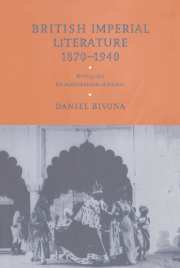Book contents
- Frontmatter
- Contents
- Acknowledgments
- Introduction
- 1 Agents and the problem of agency: the context
- 2 Why Africa needs Europe: from Livingstone to Stanley
- 3 Kipling's “Law” and the division of bureaucratic labor
- 4 Cromer, Gordon, Conrad and the problem of imperial character
- 5 T. E. Lawrence and the erotics of imperial discipline
- 6 Resurrecting individualism: the interwar novel of imperial manners
- Conclusion: work as rule
- Notes
- Bibliography
- Index
6 - Resurrecting individualism: the interwar novel of imperial manners
Published online by Cambridge University Press: 02 December 2009
- Frontmatter
- Contents
- Acknowledgments
- Introduction
- 1 Agents and the problem of agency: the context
- 2 Why Africa needs Europe: from Livingstone to Stanley
- 3 Kipling's “Law” and the division of bureaucratic labor
- 4 Cromer, Gordon, Conrad and the problem of imperial character
- 5 T. E. Lawrence and the erotics of imperial discipline
- 6 Resurrecting individualism: the interwar novel of imperial manners
- Conclusion: work as rule
- Notes
- Bibliography
- Index
Summary
You are a creature of the despotism, a pukka sahib, tied tighter than a monk or a savage by an unbreakable system of tabus.
George Orwell, Burmese DaysThe political leaders most impressed with T. E. Lawrence's deeds of valor — Lord Curzon and Winston Churchill — sought to reconceive the British imperial mission in the aftermath of World War I, and their reconceptualization would place greater emphasis not only on the indirect exercise of power but on a new (at least public) commitment to the eventual independence of the lands Britain ruled. The Common-wealth idea, which benefited from Lawrence's public support, was one new idea which seemed to offer a chance for the British government to retain its colonial empire while making fine adjustments in the way colonialism was portrayed to the public. In the immediate postwar era, as Kathryn Tidrick has said, “The Commonwealth became to politicians and men of affairs what Indirect Rule was to the DO — a chance to display those qualities which justified them in the possession of an empire, and thereby ensure its perpetuation.”
Another new idea was “mandate” rule. Lord Cromer's view of imperial service as a moral duty the conqueror performs for the conquered seems to have finally become official policy in this period, with the acceptance by the British government of League of Nations' “mandates” to rule a number of territories said to be “on the road” to independence.
- Type
- Chapter
- Information
- British Imperial Literature, 1870–1940Writing and the Administration of Empire, pp. 156 - 192Publisher: Cambridge University PressPrint publication year: 1998



